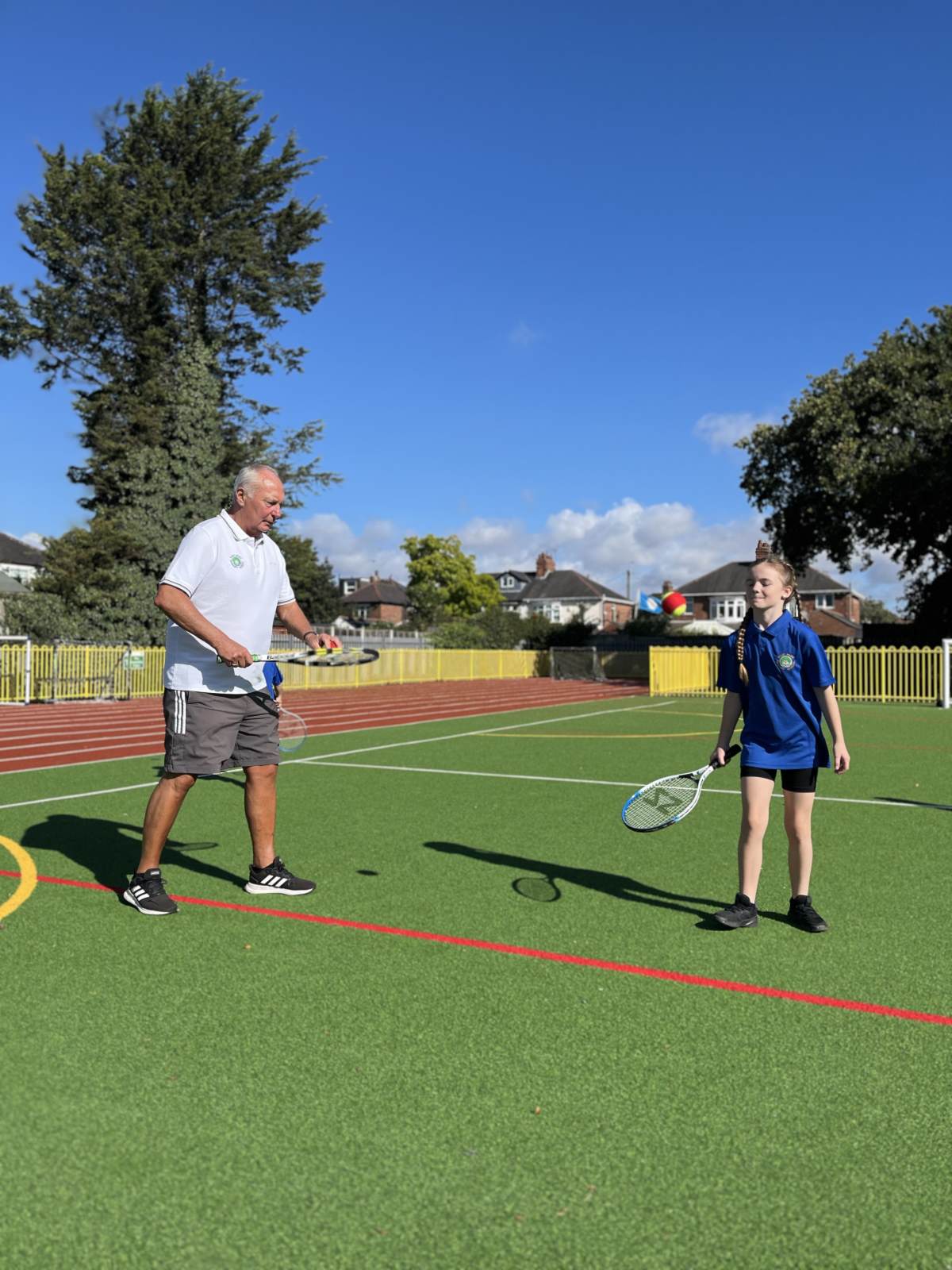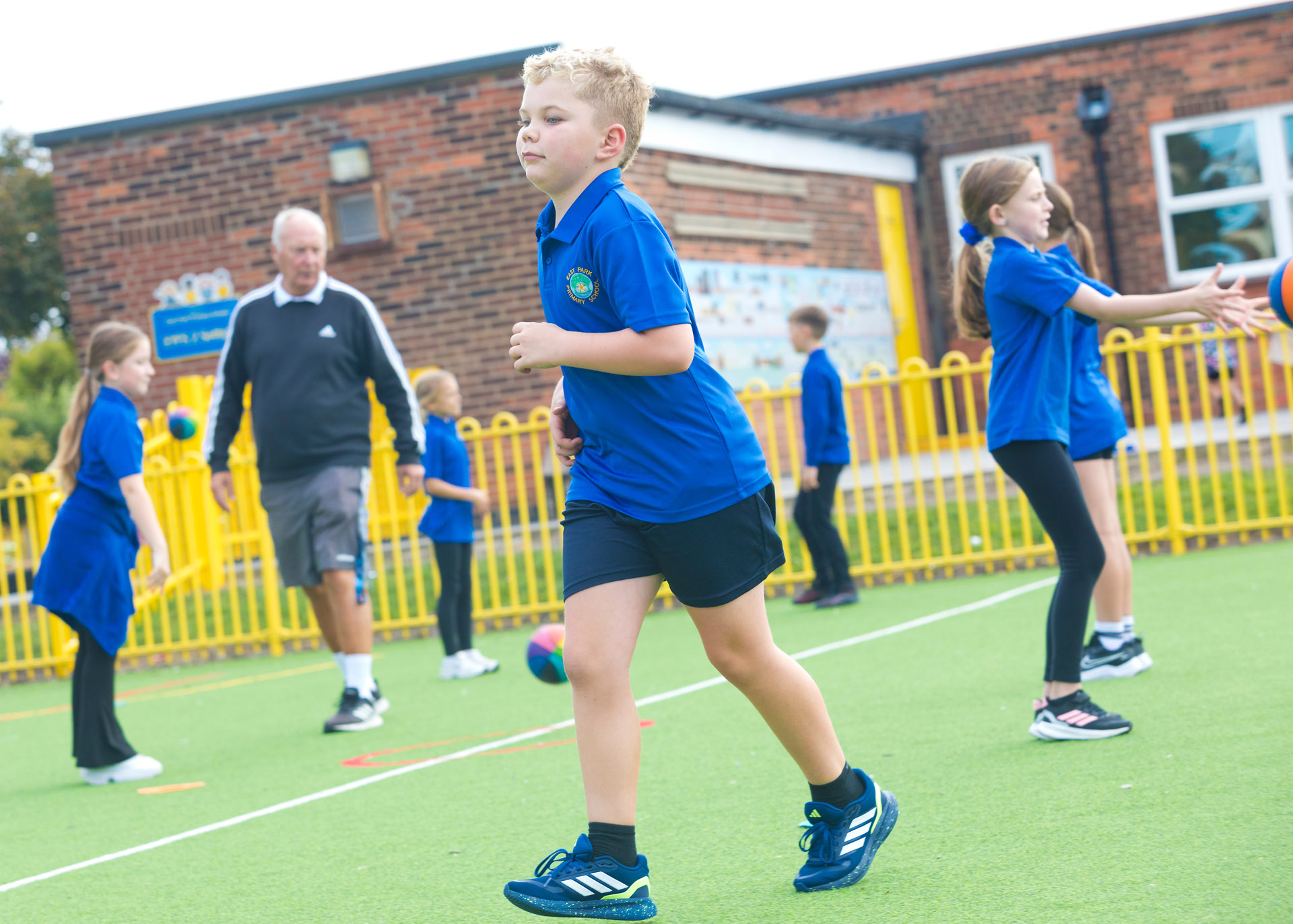Physical Education
At East Park Primary School we are passio nate about PE and the impact it can have on children throughout their learning journey. We see it as a great release for many children, offering them the freedom to express themselves through PE and sport.
nate about PE and the impact it can have on children throughout their learning journey. We see it as a great release for many children, offering them the freedom to express themselves through PE and sport.
PE Intent
At East Park Primary School, the Physical Education curriculum we provide is broad and balanced, allowing our children access to a wide variety of PE and sports provision. We offer high-quality teaching and learning opportunities that inspire all of our children to succeed in physical education through our curriculum, extra-curricular activities and enrichment opportunities.
In line with the National Curriculum 2014, our curriculum is designed to provide opportunities for children to be actively involved and engaged in a wide range of sports. Through Physical Education we develop our children’s knowledge, skills and understanding, so that they can perform with increasing confidence and competence in a range of physical activities.
Throughout our curriculum, we teach children how to cooperate and collaborate with others as part of an effective team, understanding fairness and respect.
Within our inclusive curriculum, we offer many opportunities for our children to take part in competitive sports by providing access to both intra-school and inter-school competitions throughout the academic year. We ensure that all children have represented East Park Primary at a local tournament before leaving in year 6.
At East Park Primary, we highlight our children’s achievements, share our children’s experiences and celebrate successes with our school family. Our aim is to ensure that our children’s experience of Physical Education is enjoyable and motivating and that their attitudes towards living a healthy, active lifestyle are positive. We aim to improve their health and well-being, promote active participation and lifelong learning, and for each child to fulfil their potential.
PE Implementation
To ensure high standards of teaching and learning in PE, we implement a curriculum that is progressive throughout the whole school. PE is taught through half-termly topics, focusing on the knowledge and skills stated in the Primary National Curriculum 2014, which we use as a starting point, and embellish and deepen further as a school. At the heart of this is children being exposed to quality experiences and lessons that foster a positive and proactive attitude and approach to maintaining a healthy lifestyle.
Teachers plan a series of lessons that are engaging, broad and balanced using our progression of knowledge and skills document, whilst ensuring they are suited to their class’ needs and physical abilities. This document ensures the curriculum is covered and the skills, knowledge and vocabulary taught are progressive from year group to year group, in depth. Where possible, teachers, in conjunction with subject leaders, plan purposeful cross-curricular links.
At East Park Primary School we provide a variety of opportunities for learning PE. The physical education curriculum allows children to develop and master skills through a range of challenging and enjoyable sporting activities including: invasion games, net & wall games, strike and field games, gymnastics, dance, swimming and outdoor & adventure. Pupils participate in two hours of high quality PE lessons each week, covering two sporting disciplines every half term. Children in Year 5 learn how to keep themselves safe by practising their swimming skills in a two-week course in the spring term. In addition, pupils are encouraged to participate in a varied range of extra-curricular activities. Sport clubs are available at lunch time and after school, and the children are encouraged to complete the ‘Daily Mile’ throughout the week, which helps to meet the government target of all children being active for at least 60 minutes a day. Sport equipment is also available during break times to help foster an active lifestyle. Throughout the year, children participate in workshops covering a variety of sports, for example: rugby, tennis, Flex Dance and cricket, again providing the children with an opportunity to develop and improve their fitness, and to try something new.
East Park Primary School is part of the Hull Active Schools community where children are invited to attend competitive sporting events within the local area. This is an inclusive approach which endeavours to encourage not only physical development but also mental wellbeing. These events also develop teamwork and leadership skills and are very much enjoyed by the children. Furthermore, as a school, we also partake in national sporting initiatives and fund-raising events where possible, as well as our annual Sports day. The children’s work and achievements are celebrated through displays, social media posts and award ceremonies both in and out of school, as well as sometimes being featured in the local newspaper.
Subject leaders play a key role in the success of the curriculum by leading on monitoring, evaluation and review, and the celebration of good practice contributes to the ongoing commitment to improve further. Subject leaders are given the opportunity to develop their own subject knowledge, skills and understanding, so they can support curriculum development and their colleagues throughout the school.
Impact
The curriculum subject leader is responsible for monitoring and evaluating their own subject responsibility. The information gathered from the monitoring and evaluation informs the impact for that curriculum area. Judgements on the impact of the curriculum subject is based upon a triangulation of PE evidence scrutiny, pupil voice discussions, outcomes of assessments and the quality of teaching and learning. Governors undertake termly learning walks for their subject responsibility and receive a termly report from the subject leader identifying strengths and areas for development.
Our aim is that at the end of each school year, pupils will have participated in a variety of sports through quality teaching that is engaging and fun. They will have gained a deepening understanding of how to take responsibility for their own health and fitness, and will know how to cooperate and collaborate with others as part of an effective team, understanding fairness and equity of play to embed life-long values. Children will be equipped with the necessary skills and a love for physical activity, many of whom will also enjoy the success of competitive sports.
Through discussion and feedback, children talk enthusiastically about their PE lessons and show an awareness and interest in how to attain optimum physical and emotional development and good health. Pupils use vocabulary they have been taught to appreciate and discuss the rules and techniques employed by a range of sports. They are physically active and this has positive implications on their learning in the classroom.
By the time our children leave East Park Primary School, we will have equipped them with a breadth of knowledge, skills and sporting experiences to give them a secure foundation for their secondary school learning. Our PE curriculum will have instilled in them a love and enjoyment of learning about health and fitness, and an understanding of how important PE can be in acquiring skills and knowledge that can be utilised to ensure the children live happy and healthy lives.
Rationale for sequencing of knowledge and skills in Physical Education
The PE curriculum at Spring Cottage is sequenced so that children develop knowledge and skills across the main concepts of: Games (including basic skills), Gymnastics, Dance, and in KS2 Athletics, Outdoor and Adventurous Activities (OAA) and Swimming. Units of learning have been chosen to build sequentially within each of these concepts.
Games (including basic skills)
In KS1 children develop a range of basic skills in movement and with a ball, which are then built on further in Year 2 by applying these into a range of small game situations using tactics and following simple rules. This initial knowledge is then built on in KS2 through the teaching of specific sport sports which participate in.
In KS2 the teaching in games is targeted around three main areas: Invasion Games, Net/ Wall Games and Striking and Fielding Games. Again, within each of these areas knowledge and skills progress. For example within the areas of net/wall games children develop individual racket control in Year 3 with badminton, moving to table tennis in Year 4, tennis in Year 5 and finally volleyball within Year 6, utilising their net/wall skills in a team situation.
Gymnastics
Within Year 1 children are taught to develop increased balance, control and coordination across a range of movements. This is further built on across Year 2 through the concept of sequence and traveling, linking together a range of movements, within increasing control.
As children progress into KS2 movements become more complex and children begin linking complex movements with increased precision using equipment such as springboards, vaulting horses and benches. Within gymnastic lessons children are encouraged to evaluate their own performance and that of other children using this knowledge to refine and improve performance.
The knowledge and skills progression sets out clearly which specific movements children should master and refine such as a types of jumps and rolls.
Dance
Within KS1 children develop an understanding of communicating mood and feeling to a range of stimuli, such as music and stories focussing on beat and tempo. They are also taught a range of simple movements through mirroring, and call and respond teaching which they use to create their own simple routines.
In KS2 children’s performances become more complex varying tempo and energy, and developing skills such as unison and canon to develop dances with partners and groups. By the end of KS2 children are confident improvising and dancing with control and expression to create complex sequences to music.
Athletics (KS2)
Athletics teaching begins formally within Year 3, prior to this many introductory elements are taught with games and basic skills in KS1. All athletic teaching in centred around improving their own personal best across a range of athletic disciplines.
In Year 3 Athletics begins with a introduction into different types of running, throwing and jumping events. Over the course of each year group teaching centres around introducing new concepts such as pacing in longer events, use of arms when sprinting and accuracy when throwing.
By the end of KS2 all pupils are use their knowledge of each event to analyse their own performance and suggest ways in which their times and distances could be improved.
OAA
The teaching of outdoor and adventurous activities builds progressively across KS2. This starts in Y3 with children attempting simple problems whilst working as a team to find locations. As they move through KS2 children begin to gain a better understanding of maps and use these to navigate set courses, before completing a complex orienteering challenge
-
EP PE Curriculum Journey
download_for_offline
download_for_offlineEP PE Curriculum Journey
- EP PE Curriculum Overview download_for_offline
↑download_for_offlineEP PE Curriculum Overview
- EP PE Essential Knowledge download_for_offline
download_for_offlineEP PE Essential Knowledge
- EP PE pedagogy download_for_offline
download_for_offlineEP PE pedagogy
- EP PE Vocabulary Progression download_for_offline
download_for_offlineEP PE Vocabulary Progression
- EP PE Curriculum Overview download_for_offline



